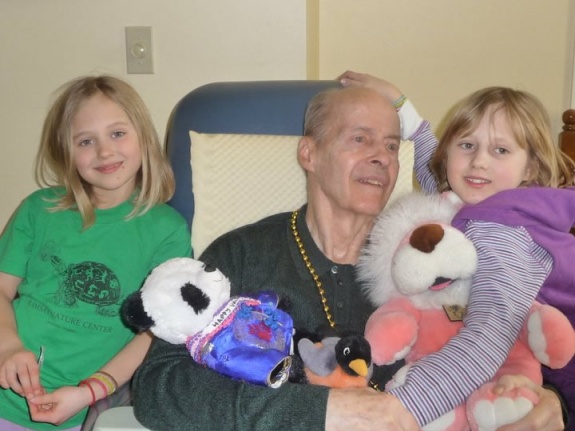Margo W. - Continue to Help

My maternal grandmother, an ordained minister in the Congregational Church, died of Alzheimer's in 1976. She was 77 when she died. My father died of Alzheimer's in 2010. He was 85. This picture is of my dad with my daughters in March 2010. He died from the complications of Alzheimer's on October 31, 2010. He was a physician, a passionate supporter of opera, sang in the choir, read voraciously, loved telling stories, gardening, eating, singing, dancing, scuba diving, movies, and traveling. Known by many simply as "Doc" he savored every bite of the feast of life with never-ending curiosity, but humbly and constantly gave of himself. Everywhere he went his ever-present wide smile was contagious. That March, his smile was still there but his great mind was gone.
My mother has Alzheimer's disease and though she still knows who her children are, she gets her grandchildren and other relatives all mixed up, and has forgotten who many people are. Even though she is now in assisted living and participates in daily activities and has much opportunity for social interaction, she fights loneliness. Why? Because she has lost her imagination she can't imagine what to do with her time. She can't follow TV shows or movies or conversations that last longer than 2 minutes. She can't read much because she can't remember what she read 2 paragraphs before, let alone what she read yesterday. And she was an avid reader and very much a "people person."
But Alzheimer's has slowly stripped that away from her. Yes, she has her moments of lucidness, but she asks the same questions over and over and over, has no sense of time, and cannot follow a brief conversation. She needs help taking her meds, needs help changing her sheets, doing laundry, doing simple tasks. We are lucky that we have the means to have her in a place where she gets loving care, nutritious food, and good healthcare.
But what about those who cannot afford a nice assisted living facility? They will have to give up jobs (and therefore income) to care for their loved one. They will be sad, depressed, and frustrated on a daily basis watching the mind of their formerly smart, active and engaging loved one slowly wither away mentally. My mother is a different person than she used to be. She is there, is physically in amazing shape but I can no longer ask for her advice, can no longer get information about the past, and constantly have to tell her how old my children are.
I don't live in the same city as she does my brother bears the burden of daily or almost daily issues that arise. I can't even imagine what it would be like if I had to care for her every day. Multiply that by the millions of people who have it or will get it. Plus the millions of people who are or will be caregivers.
The cost both financial and human is incalculable. So what will happen to me and my siblings? Our children? An effective treatment or cure is essential. The research is making progress but it's not there yet. More needs to be done until a cause or treatment or cure can be found. Keep up the momentum and fund even more. It will save even more in the future."